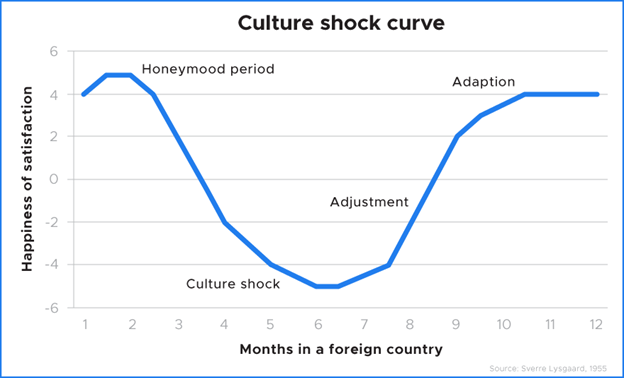Chapter 10 – International Projects
10.6. Culture Shock and Coping
Culture shock is a feeling of uncertainty and being disoriented when a person is in an unfamiliar way of life in a different culture from their own culture. It is caused by a number of things. These could include a greeting (handshake versus bowing), different food, language differences, finding their way around in a new city/town, or not following the local customs. Often a person may feel a sense of frustration, anxiety and be confused. Many people are homesick.
The 4 Phases of Culture Shock
According to Participate Learning (2018), the 4 phases of culture shock are :
Honeymoon: The person(s) feels overwhelmed and positive. They are excited about the new challenge in a different culture. They want to experience all the new things: food, the people, the language. The person(s) feels this has been a great decision and a great adventure. Each person is different in their response. However, everyone is affected to some degree.
Frustration: The person(s) feel fatigue because they do not understand the signs, gestures, language, and communication styles. It may be difficult to order food, shop for food, not be able to follow the transportation system. Some people begin to feel homesick and become depressed.
Adjustment: Over time, the person(s) begins to become familiar with their surroundings. They are more comfortable with the people, culture, language, and food.
Acceptance: After some weeks or months of dealing with frustration and emotional struggles, the person(s) begins to adapt and accept their new culture. They may not understand everything about the culture; however, function within it in a healthy way. They find and use resources to cope. They feel more at ease and accepted by the new community.

Some would suggest there is a fifth stage called re-entry shock. This happens to people when they return to their home country. They need to re-adjust again.
Dealing with Culture Shock
Human Resources is engaged in many different coping strategies when dealing with the project team abroad. Success depends on the individual and the specific situation. Human Resources may help the team set goals, including getting physical exercise, practicing meditation, and writing in a journal. They may develop a plan with the team to immerse themselves in the culture for a while, and then draw back to create stability with things that are familiar to them. Examples for Canadians in Mexico might be going to a movie theatre where only Spanish is spoken a few times, and then visiting an English-speaking theatre a few times. Eat in authentic Mexican restaurants, and then find a restaurant that cooks Canadian food.
The first step Human Resources wants to impart to the project team is that they need to acknowledge that they will experience culture shock. Then, they help them modify their behaviours accordingly. Also, they may provide support to lower the team’s expectations of “fitting into” the culture too soon. They encourage the team to focus their attention on the priorities first and reward themselves with small achievements. Over time, most people start to live a more normal life in the foreign country. Most people move to the adjustment phase and then to acceptance.
Other considerations are to instill in the team that while they are abroad, initially, they may not perform as efficiently. Therefore, good stress management techniques are important for the project team. They want to assure the team that they are not alone, and the entire team is experiencing the same emotions. Human Resources could work with the entire project team to manage their stress through group workshops, individually, or both.
In these situations, and over time, if a person is still not reaching the adjustment or acceptance phase, this becomes more serious for the team member and the project. If a person is still experiencing stress from the move to a foreign country, they may need professional counselling. Human Resources can arrange counselling through wellness programs. It is important that Human Resources be aware of the person’s emotional health and watch for severe signs such as drug abuse, emotional breakdowns, and increased alcohol use. Constant contact with the project team is a way to observe the changes. Regular chats and meetings with the project team allow Human Resources to monitor the team’s progress in adjustment and acceptance to the new environment.
Some people experience the same culture shock when they return to their home country. Human Resources needs to ensure a healthy and stable return to the team’s previous jobs. Some team members may have less responsibility upon return, others might become bored, or some may not have a job to return to when returning. Perhaps the organization has changed since their departure, and the team find it difficult to adapt to the organizational changes. While others often receive financial perks for accepting assignments abroad, and those perks disappear upon their return. The team may need to adjust to a lower standard of living. Regardless of the return experience, human resources need to work with the project team until they feel effective in their job upon return.
Think!
As a Human Resources Specialist, what do you think the first thing is that you would want to address with an expat once they have been hired for an international assignment? Why would you choose this?

